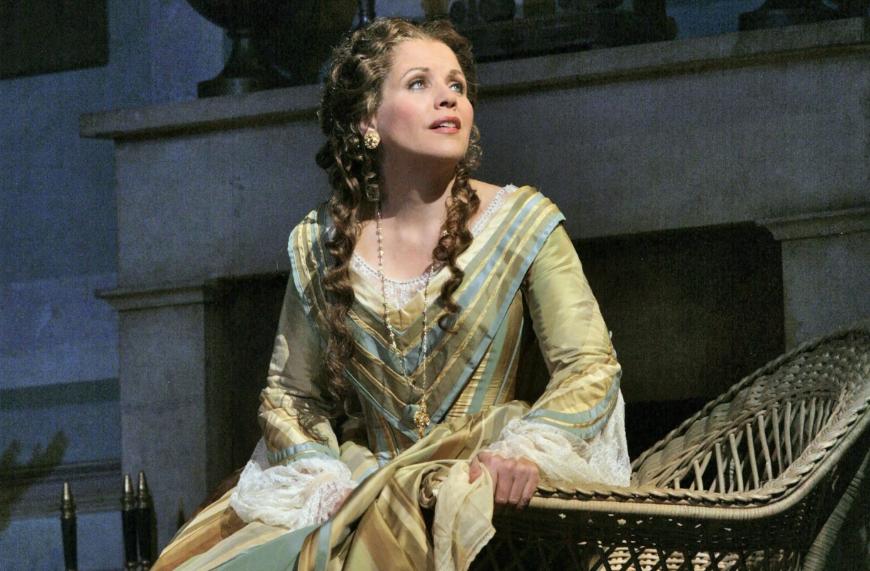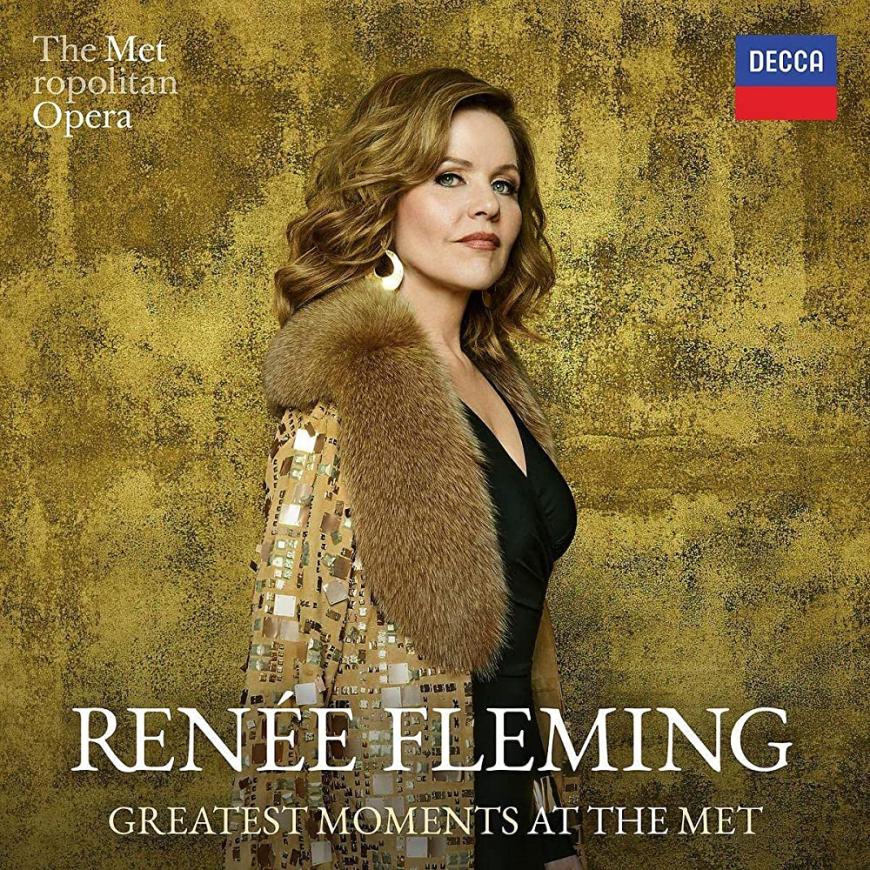
More than three decades after America’s most celebrated soprano made her March 16, 1991, Metropolitan Opera debut, the company has teamed with Decca to release a two-CD set of Renée Fleming’s Greatest Moments at the Met. Once you make peace with the mediocre sonics and Fleming’s idiosyncrasies, there’s much to love, including a glorious helping of radiant high notes.
The Met recorded Fleming’s live performance as the Countess in Mozart’s Le nozze di Figaro in November 1998, seven years after she made her Met debut in the role. Her singing is alive to the moment, notably warm, and marked by great attention to detail. Those familiar with the classic Countess of soprano Elisabeth Schwarzkopf will discover a very different approach to the aria “Dove sono” (Where have they gone), in which conductor James Levine jettisons strict tempo in favor of an immensely expressive, carefully wrought, diva-indulgent characterization.
As much as Fleming’s few interpolated notes honor historic-performance tradition, the tempo shifts leave no question as to which tradition comes first. Regardless, the singing is gorgeous and emotionally expressive. The subsequent “Sull’aria” (On the breeze) duet with Cecilia Bartoli is, despite a barely audible high B-flat, as fine as it is disciplined.
Jump ahead just one year, to Fleming’s Donna Anna in Mozart’s Don Giovanni, and we discover a version of “Non mi dir, bell’idol mio” (Do not tell me, my idol) so metronomically wayward as to make one pause (which Fleming does frequently). Disturbing lapses of style mark both the first brief run of notes and multiple phrases that follow. Together with several swoons and other self-indulgent anomalies, she and Levine slow down so much in the final flourish as to almost lose momentum — the performance suggests that as Fleming’s career progressed, she indulged more and more in the mannerisms you might call “Fleming-isms.”

Take, for example, the vocally ravishing “Depuis le jour” (Since the day I gave myself) from the 1996 televised gala in celebration of Levine’s 25th anniversary at the Met. Fleming is in sensational voice, the high notes seemingly picked out of thin air and the softest diminuendos perfectly controlled. Yet, almost halfway in, she ends the phrase “Tout vibre” with a swoon more suitable to Blanche DuBois than Gustave Charpentier’s Louise. How she finishes the word “souvenir” is equally disruptive to the rapture. But if you want to hear a soprano who makes you hang on to every note and love her so much that you forget the idiosyncratic manner in which she presents a few of them, you must hear this glorious performance.
And so it goes. Fleming’s 2008 performance of “Ave Maria” from Verdi’s Otello is ideally disciplined, with a lustrous floated “Amen.” Semyon Bychkov’s conducting, too, is as spacious as it is illumined.
But the 2001 excerpt from Richard Strauss’s Arabella, conducted by Christoph Eschenbach, is marred by a little swoon amid gorgeous highs. Then, turn to the 1994 excerpts from Benjamin Britten’s Peter Grimes, and those unfamiliar with the opera may wonder what language Fleming is singing in. She sounds quite powerful in 1997’s final trio from Charles Gounod’s Faust, but her Manon in Jules Massenet’s opera of the same name is apt to swoon at a moment’s notice. By 2000, her delivery of the Marschallin’s entire first tempo-shifting line in the great final trio from Strauss’s Der Rosenkavalier (with Susan Graham and Heidi Grant Murphy in this performance) is stamped with the trademark Fleming style, the phrasing approached like a great and beautiful bird stretching its wings as it swoops and soars with the ever-changing wind.
You may not have been aware that Imogene in Vincenzo Bellini’s Il pirata was a swooning Southern belle in distress until you’ve heard a short excerpt from Fleming’s performance. Nonetheless, the high notes find her at her most luminous. Note the stylistic consistency between this excerpt and the start of her “Ah! Dite alla giovine” (Tell the young woman) from a 2004 La traviata, with baritone Dmitri Hvorostovsky in most handsome voice.
Fleming lightens her voice to cope quite wonderfully with the high tessitura of her part in the 2004 excerpt from Rodelinda. Not all the coloratura is flawless — there’s a fair amount of scooping in the final phrase — but the delightful high C is a plus. When we return to English, however, enunciation takes second place to legato in the late 2015 Merry Widow duet with Nathan Gunn.
The two-CD set ends with a performance of the great heart-tugging aria from Erich Wolfgang Korngold’s Die tote Stadt. As I listened to this gorgeous excerpt from the Met’s 125th-anniversary gala in 2009, I struggled to keep echoes of the unforgettable, stylistically idiomatic 1924 duet version by Lotte Lehmann and Richard Tauber out of my head. Mostly, though, it will be easy to surrender to all that is beautiful, captivating, and disruptive in the artistry of Renée Fleming.
Correction: The review as originally published said Nathan Gunn was the baritone in “Ah! Dite alla giovine.” In fact, it was Dmitri Hvorostovsky.




